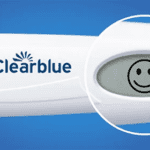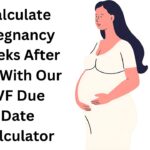
There isn’t a specific “perfect” time for pregnancy. It’s common for people to hear that having a baby after the age of 35 comes with increased risks. This belief might make you think that not many people have babies beyond this age. However, the reality is that there are actually many individuals who have babies in their 40s.
If you find yourself pregnant at the age of 41, 43, or even older, it’s natural to have concerns about how your age could affect your pregnancy. Fortunately, although the chances of complications are generally lower in your 20s and 30s, it is still possible to have a healthy pregnancy in your 40s. This is particularly true if you are in good overall health and receive regular prenatal care. If you’re interested, you can find more information about how to prepare for pregnancy after 40.
Related: Can You Take Mucinex To Get Pregnant?
How Many Women Have Babies in Their 40s?
According to the New York Times, more than 100,000 Americans give birth in their 40s each year. However, fertility declines as women get older, and the chances of getting pregnant in any given month become lower as women age. By age 40, around 1 in 10 women will get pregnant per menstrual cycle.
Despite the decline in fertility, the number of women having babies in their 40s is increasing. Recent research from the Pew Research Center shows that, as of 2016, 86% of U.S. women had given birth, one way or another, by their early 40s. Births among women ages 40-44 have been rising since the early 1980s and kept rising in 2017, even as the overall U.S. birth rate fell to a record low.
Related: How Many Days After Sex Can You Take A Pregnancy Test?
What are the Chances of Getting Pregnant in Your 40s?
Getting pregnant after the age of 40 is possible, but it can be more difficult. Fertility generally starts to reduce when a woman is in her early 30s, and more so after the age of 35. By age 40, the chance of getting pregnant in any monthly cycle is around 5%.
It’s important to note that the risks of pregnancy complications increase as women age. The U.S. National Birth Defects Prevention Study found that women over the age of 40 are at increased risk of having babies with multiple types of heart defects, genital abnormalities, skull deformities, and esophageal malformations. Additionally, the risk of miscarriage is higher in women over 40.
Related: BBT Chart Pregnant vs Not Pregnant?
What are the Pregnancy Risks After 40?
Pregnancy after 40 is considered high risk. Here are some of the risks associated with pregnancy after 40:
- Increased risk of chronic illnesses such as obesity, high blood pressure, and diabetes
- Higher rates of preeclampsia, gestational diabetes, postpartum hemorrhage, and hysterectomy
- Increased risk of ectopic pregnancy
- Higher risk of multiple types of heart defects, genital abnormalities, skull deformities, and esophageal malformations in the baby
- Higher risk of miscarriage
- Higher risk of stillbirth
- Higher risk of premature birth
- Higher risk of C-section delivery
- Higher risk of breast cancer
Related: True Stories of Pregnancy after Tubal Ligation
How to Prepare for Pregnancy After 40?
Preparing for pregnancy after 40 requires special attention to your health and lifestyle. Here are some tips:
- Start taking prenatal and omega-3 supplements at least three months prior to pregnancy.
- Eat a balanced diet rich in vitamins and nutrients.
- Exercise regularly and maintain a healthy weight.
- Stop alcohol, marijuana, and tobacco use.
- Manage existing health problems with your doctor’s help.
- Try more frequently during your fertile window.
- Ditch drinking and smoking.
- Focus on healthy eating, getting plenty of exercise, and practicing good sleep hygiene to help improve your chances of conception.
- Consider the risks and benefits of having a baby at 40.
- Be prepared but not fearful as you consider the challenges of pregnancy later in life.
- Work with a care provider to reduce health risks to yourself and your baby.
- Know that getting pregnant after 40 is possible, but it may take longer.
- Be optimistic and stay positive.
What are some Prenatal Tests that are Recommended for Women over 40?

Women over 40 are at a higher risk for pregnancy complications, so prenatal tests are recommended to help rule out any concerns. Here are some prenatal tests that are recommended for women over 40:
- Genetic screening tests such as ultrasound, first-trimester screen, quad marker screen, amniocentesis, chorionic villus sampling (CVS), and noninvasive prenatal diagnosis.
- Routine prenatal testing such as noninvasive prenatal testing (NIPT), quad screen, and nuchal translucency screening.
- Placental cell sampling.
- Antenatal tests such as blood tests, urine tests, and ultrasound scans.
It’s worth noting that none of these tests are compulsory, and it’s up to the individual to decide whether to have them. However, chromosomal conditions are more common in babies of people aged 40 years or older, so prenatal screening tests are highly recommended to assess the risk of your baby having one of these conditions.
What is the difference between Genetic Screening and Noninvasive Screening?
Genetic screening and noninvasive screening are two types of prenatal tests that are used to assess the health of a developing fetus. Here are the differences between genetic screening and noninvasive screening:
Genetic Screening
- Evaluates substances in the blood (analytes) and nuchal translucency in the back of the fetal neck.
- Provides data that can help assess if a fetus has one of three genetic anomalies: Down syndrome, trisomy 13, or trisomy 18.
- Is intended to determine, with as much certainty as possible, whether a specific genetic disorder or condition is present in the fetus.
- Includes prenatal genetic screening (serum screening with or without nuchal translucency [NT] ultrasound or cell-free DNA screening) and diagnostic testing (chorionic villus sampling [CVS] or amniocentesis).
Noninvasive Screening
- Picks up tiny pieces of DNA in the mother’s bloodstream and analyzes them for factors that would raise the risk of the fetus having certain genetic abnormalities.
- Provides information about the possibility of a fetus having certain genetic abnormalities that could result in a child being born with a serious health condition.
- Is a newer method that provides a result with a blood test only.
- Includes noninvasive prenatal testing (NIPT), which is a blood test that looks for signs of Down syndrome, trisomy 13, and trisomy 18 by analyzing free fragments of DNA in the bloodstream.
What is the Accuracy of Prenatal Tests for detecting Chromosomal Conditions in Babies of Women over 40?
The accuracy of prenatal tests for detecting chromosomal conditions in babies of women over 40 varies depending on the type of test. Here are some relevant information:
- Amniocentesis: This test detects most chromosomal disorders with a high degree of accuracy. There is a low risk of miscarriage as a result of amniocentesis – about 1 in 1,600.
- Maternal Blood Screen: This is a simple blood test that measures the levels of two proteins, human chorionic gonadotropin (hCG) and pregnancy-associated plasma protein A (PAPP-A). If the protein levels are abnormally high or low, there could be a chromosomal disorder in the baby. However, this test is not diagnostic and only indicates the need for further testing.
- Ultrasound: This test is used to look for certain birth defects related to the baby’s heart or chromosomal disorders, such as Down syndrome. However, it is not a diagnostic test and only indicates the need for further testing.
- Diagnostic Tests: These tests are offered to women with higher risk pregnancies, which may include women who are 35 years of age or older. The diagnostic accuracy of karyotyping with amniocentesis is 99.4–99.8%, and for chorionic villus sampling (CVS) it is 97.5–99.6%. These diagnostic tests carry a small risk of miscarriage.
It is important to note that no test can guarantee that a baby will be born without an abnormality, and no test is 100% accurate. If a screening test suggests an increased chance of a genetic condition, further diagnostic tests will be offered to give a more definite diagnosis. Talking to a healthcare provider can help women decide which tests are right for them.
Conclusion
Embarking on the journey of how to prepare for pregnancy after 40 requires careful consideration, preparation, and professional guidance. By prioritizing preconception health, understanding the impact of age on fertility, and making informed choices, you can increase your chances of a successful pregnancy. Remember to consult with healthcare professionals, adopt a healthy lifestyle, and seek support from relevant communities. With the right preparation and support, your dream of becoming a parent can come true, regardless of age.
Frequently Asked Questions (FAQs)
Is it possible to Conceive Naturally after 40?
Yes, it is possible to conceive naturally after 40, although the chances decrease significantly compared to younger ages. Understanding your fertility status and seeking professional guidance can help you determine the best course of action for your individual circumstances.
What are the Risks associated with Pregnancy after 40?
Pregnancy after 40 carries a higher risk of certain complications, such as gestational diabetes, high blood pressure, and chromosomal abnormalities in the baby, such as Down syndrome. Regular prenatal care and monitoring can help manage and mitigate these risks.
Should I consider Fertility Treatments?
Depending on your specific situation, fertility treatments such as IVF or egg freezing may be options worth considering. Consulting with a fertility specialist can provide valuable insights and help you make an informed decision based on your unique circumstances.
Are there any Natural Methods to enhance Fertility?
While there are no guarantees, certain lifestyle changes may positively influence fertility. These include maintaining a healthy weight, managing stress levels, optimizing nutrition, and avoiding exposure to toxins.
Are there any Alternative Options to Biological Parenthood?
If conceiving naturally is not feasible or desirable, alternative options such as adoption or surrogacy can be considered. Exploring these alternatives with a qualified professional can help you navigate the process and make an informed choice.
What Support Networks are available for individuals considering Pregnancy after 40?
Numerous support networks, both online and offline, cater specifically to individuals contemplating pregnancy after 40. Joining these communities can provide emotional support, valuable insights, and the opportunity to connect with others going through similar experiences.












